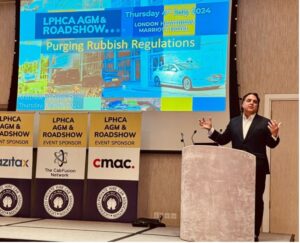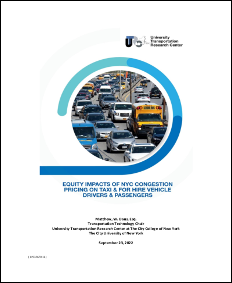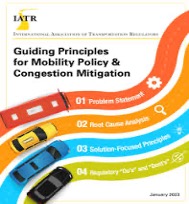
London Calling – The Clash

On July 4, 2024, I spoke at the Licensed Private Hire Car Association’s (“LPHCA”) 2024 Annual General Meeting and Roadshow in London. The LPHCA is a membership-based trade association representing licensed private hire operators in the UK. The Association provides help and information on licensing, industry matters, and news for members, and it supplies information for industry product suppliers, local authorities, licensed operators, and private hire and taxi drivers.
The LPHCA is chaired by Steve Wright. Steve played a key role in passing the London Private Hire Vehicles 1998 Act, which fully licensed the PHV industry. After its passage, he worked closely with Transport for London (TfL), serving two terms on its board. Steve also advised the Olympic Delivery Authority in 2012 and contributed to the Law Commissions Taxi and PHV Review. In 2018, he helped shape national taxi and PHV standards as part of the government’s Task and Finish Group. Currently, he’s focusing on post-pandemic challenges like driver shortages, especially in SEND transport, and advocating for restricted licenses to improve safety and supply issues.

My session, entitled Purging Rubbish Regulations, delved into the pressing issues confronting for-hire vehicle (“FHV”) operators in the U.S. and London. These include the significant impact of congestion pricing and other passenger fees and taxes, as well as the urgent need for modernizing regulations. The disparity in taxi fees between New York City (“NYC”) and London is stark, with NYC taxis accumulating a high initial flag drop charge, congestion surcharge, improvement surcharge, rush hour surcharge, and MTA surcharge, totaling $8.50 per trip. In contrast, London taxis have a more modest initial charge of approximately $4.80 and are exempt from local congestion surcharges. FHV passengers in NYC, on average, pay $6.00 in fees, including the congestion surcharge, the Black Car Fund surcharge, sales tax, and the MTA surcharge. In contrast, private-hire vehicle riders in London can pay approximately $20 for the London congestion charge and an additional $16.40 for the Ultra-Low Emission Zone (“ULEZ”) charge.
Since 2019, New York’s congestion surcharge has generated approximately $1.5 billion for the MTA from taxi and FHV trips below 96th Street in Manhattan. If the MTA ever implements congestion pricing, under the most recent plan, Uber and Lyft passengers would pay an extra $2.50 per ride below 60th Street in Manhattan, and taxi and other FHV passengers would pay an extra $1.25 per trip. The taxi and FHV industry, which helps address car dependency as a fixture of the NYC transit ecosystem, does not need more charges attached to trips.
My 2022 report, “Equity Impacts of NYC Congestion Pricing on Taxi and For-Hire Vehicle Drivers & Passengers,” released by the University Transportation Research Center (“UTRC”) at The City University of New York, found that taxi and FHV drivers already pay a surcharge to the MTA, that these industries have not fully recovered from the COVID pandemic, and that the toll could lead to job and income loss, and that the congestion charge would create a financial burden on riders who need these services. The UTRC report argued that the best way to address equity considerations for drivers and passengers alike would be to exempt taxis and FHVs from the tolling program.
The International Association of Transportation Regulator’s (“IATR”) 2023 report, “Guiding Principles for Mobility Policy and Congestion Mitigation,” advocates for congestion pricing and tolling policies that 1) incentivize sustainability and equity by exempting or reducing fees for shared rides, and 2) designate revenue streams for EV grants and inter-modal connections through a policy-directed lockbox. Additionally, the IATR recommends exemptions and subsidies for low-income individuals, TNCs, for-hire vehicles, and taxis to make congestion pricing equitable.
The U.S. and UK differ in some ways over mobility regulations, but there are certain ways in which both can modernize regulatory practices relating to taxis and FHVs. The IATR has been very involved in streamlining and modernizing taxi regulations via its report entitled “Modernizing Taxi Regulations: An Innovative Governance Framework for the Future” (https://iatr.global/iatrs-modernizing-taxi-regulations/). Now it is time to focus on private hire and for-hire vehicle regulatory modernization.
First, regulators must review long-standing rules holistically to address current market conditions. Regulations often lag behind market demand and technology, and regulators and legislators must examine these laws to consider the changing ecosystem. Second, regulations should correct market failures, ensure fair service, and meet customer needs. Left unchecked, markets under outdated regulations can lead to market failures and hurt consumers. Lastly, market entry and eligibility requirements should promote competition and safety. Requirements can sometimes be too restrictive, hurting competition in the marketplace. For example, purging rubbish regulations could include:
• Allowing vehicle owners to choose vehicle models and types (not regulators);
• Easing vehicle age and mileage/kilometer limits to allow vehicles to remain in service longer;
• Reviewing vehicle inspection requirements to reflect advances in automotive technology (e.g., electric vehicles) and advances in inspection technology (e.g., virtual inspections and/or remote monitoring);
• Reforming and streamlining outdated geographical knowledge tests, like the UK’s “The Knowledge” test, and testing drivers on their safe handling of routing apps.
Universal licensing and reciprocity are another way that regulators can remove administrative burdens associated with licensing while maintaining safety, and promoting passenger convenience. Reciprocity between neighboring jurisdictions for taxis and FHVs can bring about numerous advantages. Allowing licensed operators to provide service in neighboring areas can expand the available pool of drivers, reduce passenger wait times, and improve operational efficiency. It can enhance passenger convenience by providing a wider range of transportation options. Reciprocity can also foster cooperation and coordination between neighboring jurisdictions, leading to more consistent regulations and enforcement. This potential for increased efficiency and convenience, along with the potential for reduced costs and increased competition, should inspire hope for the industry’s future.
New York has a limited reciprocity law for FHVs licensed in NYC and adjacent counties, allowing them to operate across certain jurisdictions under specific conditions. California permits cities and counties to accept taxi permits issued by other jurisdictions, but taxis must be “substantially located” in the county where they are permitted. Florida allows licensed operators to work in any county or municipality without additional licenses or fees, provided they have not had their license suspended or revoked in the past five years. Washington, D.C. stands out as a special case of reciprocity because its small size and proximity to Maryland and Virginia necessitate interstate cooperation. Maryland and Virginia license limousines at the state level, allowing licensed operators to provide service statewide. Washington, DC allows limousines licensed in those states to pick up passengers in DC for transport back to their licensing jurisdiction (and vice versa).
The regulatory agency of the future should aim to improve the efficiency, fairness, and accessibility of the transportation sector. It seeks to streamline processes, ensure reasonable fees, and promote equitable enforcement. Additionally, the agency focuses on increasing access to fuel-efficient vehicles to support sustainable transportation. Taxi and FHV industry policies should create more efficient and fair licensing systems and increase the number of accessible and fuel-efficient cars. Processes like virtual inspections, expediting licenses for drivers with jobs waiting, remote transactions, and automated enforcement should make operations more efficient. Regulatory fees should only cover actual licensing costs and not aim to generate revenue. Enforcement fines should be reasonable and not duplicative.
Transport for London: Regulating the PHV & Black Cab Industry

One of the leading multi-modal agencies that represents the future is TfL. TfL exemplifies a multi-modal transit agency through its integration of various transportation modes, including buses, trains, trams, cycling, and pedestrian pathways, alongside regulation of taxis and private hire vehicles (PHVs). TfL ensures Londoners have multiple efficient, accessible, and sustainable transportation options. TfL’s multi-faceted operations showcase how a transit agency can balance modern mobility demands with environmental and societal goals. Among those leading this effort for taxis and private hire vehicles are Helen Chapman, Director of Licensing, Regulation & Charging for TfL; and Graham Robinson, General Manager of Taxi & Private Hire for TfL.
During my visit, I had the opportunity to connect with senior management at TfL, a prominent member of the IATR. This regulatory body oversees taxis, PHVs, public transit, roads, and transportation throughout London. To understand the state of the private hire industry in London, it is essential to start with the state of TfL. I was reassured to learn that TfL is in a strong financial position. The agency’s ability to balance financial health with regulatory progress is a testament to the potential for public transit systems to meet evolving urban needs while maintaining economic viability. This should provide stability and reassurance about the industry’s future.
TfL’s previous financial issues stemmed from a combination of factors, exacerbated by the COVID-19 pandemic. Prior to the pandemic, TfL was already under financial strain due to large projects facing repeated delays and cost overruns. Initially budgeted at £15.9 billion, TfL’s Crossrail project’s completion date had been pushed back multiple times, with substantial impacts on TfL’s fare revenue and borrowing levels. Further complicating TfL’s finances was the loss of government operating grants, phased out starting in 2015 under then-Mayor Boris Johnson. TfL has since been reliant on fare income, which took a catastrophic hit during the pandemic, falling by 90%.
Since COVID, TfL has made significant strides in improving its financial health, with diversification of revenue streams and operating surpluses playing a pivotal role. Licensing fees from the taxi and PHV sectors have also contributed to this progress. TfL revealed that it collected more than £23 million (just over $30 million) in revenue through taxi and private hire licensing in FY 2023-24, highlighting the financial significance of the taxi and PHV sector to TfL’s finances. TfL issued nearly 130,000 licenses, which included 2,992 licenses for taxi drivers, 30,636 licenses for private hire drivers, and 95,029 licenses for private hire vehicles. Taxi driver licenses generated £897,600, while private hire drivers brought in a significantly larger £9.5 million. Most revenues came from PHVs, which accounted for £13.3 million in fees collected. TfL clarified that it uses the income solely to cover the costs of administering the licenses, along with the compliance and enforcement measures necessary to regulate the industry. TfL is also conducting a review of all taxi and private hire licensing fees to ensure they are set at appropriate levels and cover the costs of licensing, compliance, and enforcement activities. The existing license fee structure was introduced in 2017.
Alongside financial improvements, TfL has introduced regulatory updates emphasizing sustainability, such as the push for zero-emission-capable (“ZEC”) vehicles and opening an avenue for PHVs to generate extra revenue through interior and exterior advertising. As of January 1, 2023, all PHVs licensed for the first time must be ZEC) and meet the Euro 6 emissions standard. TfL’s ZEC progress positions TfL to continue delivering reliable services while investing in infrastructure and sustainability, ensuring London’s transportation system remains efficient and resilient for the future. To meet the PHV ZEC requirements, a vehicle must emit no more than 50g/km CO2 and be capable of being operated with no (zero) exhaust emissions for a minimum range of 10 miles (16.093 km); or emit no more than 75g/km CO2 exhaust emissions and be capable of being operated with no (zero) emissions for a minimum range of 20 miles (32.187 km). If an internal combustion engine is part of the vehicle specification, like a hybrid vehicle, it must meet the Euro 6 emissions standard at minimum.
Recent amendments to the PHV licensing requirements allow PHVs to display TfL-approved signs or advertising material on or from the vehicle. However, unless TfL requirements are followed, no advertising may be displayed inside the car. As of September 24th, 2024, the TfL PHV advertising signage guidelines are under review.
Congestion Pricing & Sustainability in London

London first introduced congestion pricing in February 2003. There is currently a £15 congestion charge to drive in central London from 7:00 a.m. to 6:00 p.m. Monday through Friday and from noon to 6:00 p.m. on weekends and bank holidays. Various vehicles, including taxis and emergency vehicles, are exempt. TfL is discontinuing the current exemption for electric vehicles (“EVs”) on December 25, 2025, at which time EVs will be subject to the daily £15 fee unless they qualify for a different exemption or discount. With 112,318 EVs currently registered for the exemption, its expiration will generate more revenue and help reduce congestion. PHVs designated as wheelchair-accessible vehicles will still have an exemption from the Congestion Charge as long as they are fulfilling a private hire booking. TfL most recently increased the congestion charge from £11.50 to £15.00 in 2021.
The Ultra-Low Emission Zone (ULEZ), which encompasses all London boroughs except the M25 (London Orbital Motorway), requires vehicles that do not meet ULEZ emissions standards to pay £12.50 to drive within the zone 24 hours a day, every day of the year except Christmas. While TfL’s ULEZ income for FY 2023-24 missed budgeted revenue by about £90 million, TfL ended the fiscal year with an operating surplus. For passenger vehicles, the ULEZ is enforced based on the declared emissions of the vehicle rather than the age. Petrol vehicles must be Euro 4 (NOx), and diesel vehicles must be Euro 6 (NOx and PM). According to TfL, petrol cars that meet the ULEZ standards are generally registered as new with the UK Driver and Vehicle Licensing Agency after 2005. However, cars that meet the standards have been available since 2001. Diesel cars that meet the standards are generally registered as new after September 2015. PHVs designated wheelchair-accessible by TfL will be exempt from the ULEZ charge until October 26, 2025.
In addition to proper congestion pricing policies, London must continue to incentivize electric vehicles and supporting the industry. For example, Asher Moses, Founder and CEO of Sherbet Electric Taxi Company, is a pioneer in the EV black cab space in London, pushing for innovation and electrification. It all started back in 1989 when he passed The Knowledge test and became a licensed Black Taxi driver. He went on to acquire small fleets to start what is now the award-winning Sherbet. Asher understands the need to change the way the traditional black cab business works, and to encourage more London cab drivers to make the switch to all-electric. As of 2021, Sherbet’s electric taxi fleet stood at 168 electric taxis. TfL does work to incentivize EVs in certain ways. Zero-emission vehicles are still eligible for a 100% discount on the Congestion Charge until December 24th, 2025. TfL also advertises the UK government’s low-emission vehicle grants , reduced tax rates for low-emission vehicles, and the free or reduced-charge EV parking offered by some London boroughs.
Uber in London
In March 2022, TfL granted Uber a 30-month license to operate in London, reflecting the company’s continued commitment to meeting TfL’s regulatory and safety standards. The license renewal provided stability for the company and the 45,000 drivers who depend on the platform for their livelihood. Uber’s PHV license has just been renewed. On September 20, 2024, TfL granted a PHV operator’s license for 30 months. Per the UK’s Institute of Licensing, the conditions for Uber’s new operating license in London include:
• Enhanced Safety Measures: Uber must continue to improve its safety protocols, including rigorous background checks for drivers and real-time insurance verification.
• Driver Welfare: Ensuring fair treatment and working conditions for drivers, including access to benefits and support.
• Data Sharing: Regularly sharing data with TfL to ensure compliance with regulations.
• Passenger Safety: Implementing features to enhance passenger safety, such as in-app emergency buttons and trip tracking.
• Regular Audits: Undergoing regular audits by TfL to ensure ongoing compliance with all conditions.
These measures aim to address past safety concerns and ensure a safer, more reliable service for passengers and drivers alike.
Uber provides financial incentives and assistance to drivers who purchase EVs. Through the “PowerUp Package,” the company offers drivers up to £22,750 in economic incentives. The incentives include £5,000 to buy a new or used fully electric vehicle from any maker, up to £17,000 off selected Kia EVs, and £750 in bp pulse charging credits. Bp pulse is the EV charging arm of the energy company BP. The incentives package is available until November 30, 2024.
Uber adds a £1.50 Central London Fee on all trips that start, end, or pass through the Congestion Charge zone, even if the driver is exempt from paying the daily £15 congestion fee. Fully electric and hydrogen fuel cell vehicles are exempt from the Congestion Charge until December 2025 under the “cleaner vehicle discount,” making Uber’s £1.50 Central London Fee a bonus for driving an EV. However, TfL will discontinue the cleaner vehicle discount on December 25, 2025, and EVs will be subject to the Congestion Charge unless they qualify for a different exemption or discount.
Regulatory Reform: Paving the Way for a Sustainable Future

The need for regulatory modernization in the taxi and FHV industries is clear. Outdated rules and redundant regulations burden drivers, operators, and passengers while stifling innovation. Both the U.S. and the UK have opportunities to align regulations with the current realities and rapid innovations of mobility and sustainability. By purging unnecessary and restrictive policies, regulators can foster competition, ensure fairness, and meet modern consumer needs.
As we look to the future, regulations must reflect technological advancements, such as electric vehicles and digital platforms, while also maintaining robust safety standards. Whether through reciprocity agreements, streamlined licensing, or embracing flexible, innovative frameworks, regulatory bodies like Transport for London and New York’s Taxi and Limousine Commission must lead the charge.
In the end, efficient, adaptable regulations will not only support the taxi and FHV industries but also contribute to a more sustainable, equitable, and accessible transportation landscape. Let’s move forward by shedding what’s no longer needed and creating a regulatory environment that encourages progress while safeguarding public interests.
Matthew W. Daus, Esq.
President, International Association of Transportation Regulators
http://iatr.global/




